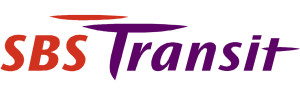SBS Transit is a multi-modal public transport operator in Singapore, founded in November 2001, although its roots can be traced back to Singapore Bus Service (SBS) which formed in 1973. It runs bus and rail transport services in Singapore, and is a subsidiary of multinational land transport company ComfortDelGro. This article will talk about SBS Transit’s bus operations.
Singapore Bus Service (SBS) was initially formed in 1973 with the government-sanctioned merger of three private bus companies, (the Amalgamated Bus Company, Associated Bus Services and United Bus Company), to improve service standards of public buses being the main mode of public transportation back then. It then held a monopoly of all bus services (a duopoly following TIBS’ entry into the market in 1982) and remains as Singapore’s largest bus operator.
In November 2001, the company was renamed SBS Transit after being awarded operating rights for the new North East Line, reflecting its status as a multi-modal transport operator while preserving its SBS namesake familiar to many. It also operates the Punggol LRT, Sengkang LRT and the Downtown Line.
Bus Operations
SBS Transit is the largest public bus operator in Singapore, operating more than 200 bus services with a fleet of some 3,000 buses (as of 2018). The bus fleet comprises mostly Volvo B9TL double-deck buses, along with Scania K230UB and Mercedes-Benz Citaro single-deck buses, based out of bus depots around the island.
The company also assembles its own buses at its Bus Assembly facility at Hougang Depot under the engineering branch of its parent company, Comfort DelGro Engineering (CDGE). All locally-assembled city buses done by CDGE are produced here, including SBS’ Volvo B10Ms, Volvo Olympians, Volvo Super Olympians, Dennis Tridents and SBS Transit’s Volvo B9TL CDGE & Wright-bodied buses.
Since its inception in the 1970s, SBS was the sole public bus operator in Singapore until the emergence of TIBS in the early 1980s, after which the Singapore bus industry became a duopoly, with SBS being the dominant operator, running its own bus routes within well-defined catchment areas largely free of competition. Through the years, SBS also oversaw initiatives such as the development of centralized bus interchanges and feeder bus systems in numerous parts of Singapore to reduce the number of roadside bus terminals.
In addition to trunk routes and feeder bus services, SBS introduced novel bus services such as:
- Blue Arrow services (1975) – Peak hour semi-express routes between residential neighbourhoods and the CBD
- National Stadium Special Services (1976) – Routes serving National Stadium during major events
- AIRBUS services (1995) – Express routes between Changi Airport and City
- Express services (1997) – Express routes plying between residential towns and to the City
- Nite Owl services (2001) – Late night unidirectional routes from the City to residential towns
- CityBuzz services (2004) – Routes operating in the City aimed at tourists
- Chinatown Direct services (2005) – Express routes plying between residential towns and Chnatown
- Parks services (2005) – Routes serving between parks and transport nodes
- Stadium Direct services (2005) – Routes serving Singapore Indoor Stadium during major concerts
- Premium bus services (2007) – Peak-hour express routes between residential neighbourhoods and the CBD
- CityShopper services (2007) – All-day express routes between residential neighbourhoods and the City
It also provided bus services to Sentosa Island and Jurong Island prior to them being operated by private bus operators.
Company milestones:
- 1977: Introduction of Double-deck buses
- 1984: Introduction of Air-conditioned buses
- 1985: One-man operation introduced to buses
- 2002: CNG-powered buses introduced
- 2006: Wheelchair-accessible buses introduced
- 2010: Hybrid buses first introduced
- 2017: Euro VI bus first introduced
Following the transition to the Bus Contracting Model, SBS Transit’s existing catchment areas were restructured into route packages and made available for competitive tendering. The company clinched the Seletar and Bukit Merah bus packages which commenced in 2018.
Operating Assets
Bus Depots:
- Ang Mo Kio Bus Depot
- Bedok North Bus Depot
- Braddell Bus Park
- Seletar Bus Depot
- Ayer Rajah Bus Park
- Bukit Batok Bus Depot
- Hougang Bus Depot
- Soon Lee Bus Park
- Ulu Pandan Bus Depot
